| Srl | Item |
| 1 |
ID:
133799
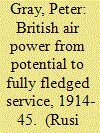

|
|
|
|
|
| Publication |
2014.
|
| Summary/Abstract |
The First World War set British air power on a path of development that by 1939 made an essential contribution to the conduct of war
At the start of the First World War, the potential of air power for military purposes had already been identified but remained largely underdeveloped, with Britain lagging behind some of its direct European competitors. Peter Gray traces how the First World War acted as a catalyst for British forces to use air power in attack and reconnaissance roles, and unleashed the potential for its further development during the interwar years. By the Second World War, air power had become an indispensable element of warfare.
|
|
|
|
|
|
|
|
|
|
|
|
|
|
|
|
| 2 |
ID:
133798
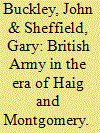

|
|
|
|
|
| Publication |
2014.
|
| Summary/Abstract |
Negative myths about the British Army's performance, especially during the Great War, obscure the reality of an institution that learned and improvide throughout both world wars
The performance of the British Army in the two world wars has been the subject of much scrutiny in both scholarly and popular history. The latter has long been dominated by the perception of an underperforming army fighting under incompetent leadership in a futile First World War, in contrast to a more successful and effective force supporting a just cause in the Second. Yet, John Buckley and Gary Sheffield argue, sound scholarly research paints a much more nuanced picture of an institution that between 1914 and 1945 underwent a rich learning process that must be understood in its entirety.
|
|
|
|
|
|
|
|
|
|
|
|
|
|
|
|
| 3 |
ID:
133800
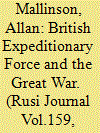

|
|
|
|
|
| Publication |
2014.
|
| Summary/Abstract |
A counterfactual account of what Britain's leaders could have done prior to the Great War to prepare the country more effectively for fighting a European land war
The decision-making of Britain's political and military leaders in August 1914 has been subject to much scrutiny in the intervening century. Allan Mallinson argues vehemently that the wrong decisions were taken in the years preceding the outbreak of the conflict, and presents a counterfactual of what Britain's experience could have been had conscription been introduced or sounder preparations for a land engagement been made before 1914.
|
|
|
|
|
|
|
|
|
|
|
|
|
|
|
|
| 4 |
ID:
140859
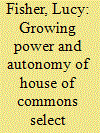

|
|
|
|
|
| Summary/Abstract |
This article is an examination of the rising prominence of House of Commons select committees during the 2010–2015 Parliament, which takes into account the impact of the Wright reforms. The new system of electing committee chairs and members is explored as a central reform that has burnished the autonomy, independence and credibility of the committees. In addition, the characteristics of the coalition government and circumstances entailed by a two-party executive are seen as factors that have made more robust the neutrality of the committees, which have been looked to ever more urgently as impartial scrutineers of government policy and personnel. As the system has been strengthened and received greater attention from the government, the public and the media, select committees have also come to present a platform upon which certain members and chairs have grown their profile. This phenomenon in turn has added to the desirability of roles on committees, which now present an alternative career route to the ministerial ladder.
|
|
|
|
|
|
|
|
|
|
|
|
|
|
|
|
| 5 |
ID:
103547
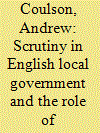

|
|
|
|
|
| Publication |
2011.
|
| Summary/Abstract |
Overview and Scrutiny Committees were introduced in England and Wales in the Local Government Act 2000 that ended the role the full council and its committees as the locus of decision-making for most local authorities. Overview and scrutiny committees composed of councillors not on small decision-making executives were tasked with holding these to account. The performance of scrutiny committees is variable. Generally they work best where they concentrate on reviews of policy and practice, with recommendations following from well-researched reports. The paper reviews the difficulties which arise when scrutiny committees endeavour to hold powerful executives to account, and suggests that to strengthen this new legislation is required, in particular to institutionalise scrutiny committees as agencies of the full council, the representative body for the area, comparable to the way in which the select committees at Westminster are the agencies of the Parliament.
|
|
|
|
|
|
|
|
|
|
|
|
|
|
|
|
| 6 |
ID:
099076


|
|
|
|
|
| Publication |
2010.
|
| Summary/Abstract |
After the expenses scandal, it is time to ask what Members of Parliament are for. The traditional formal arguments are inadequate as they fail to engage with what MPs actually do. A typology is useful in illuminating the different ways in which MPs see their role: as Lickspittles, Loyalists, Localists, Legislators, Loners and Loose Cannons. Current trends in the performance of these roles can be identified, raising questions about the nature of politics and the vitality of Parliament.
|
|
|
|
|
|
|
|
|
|
|
|
|
|
|
|